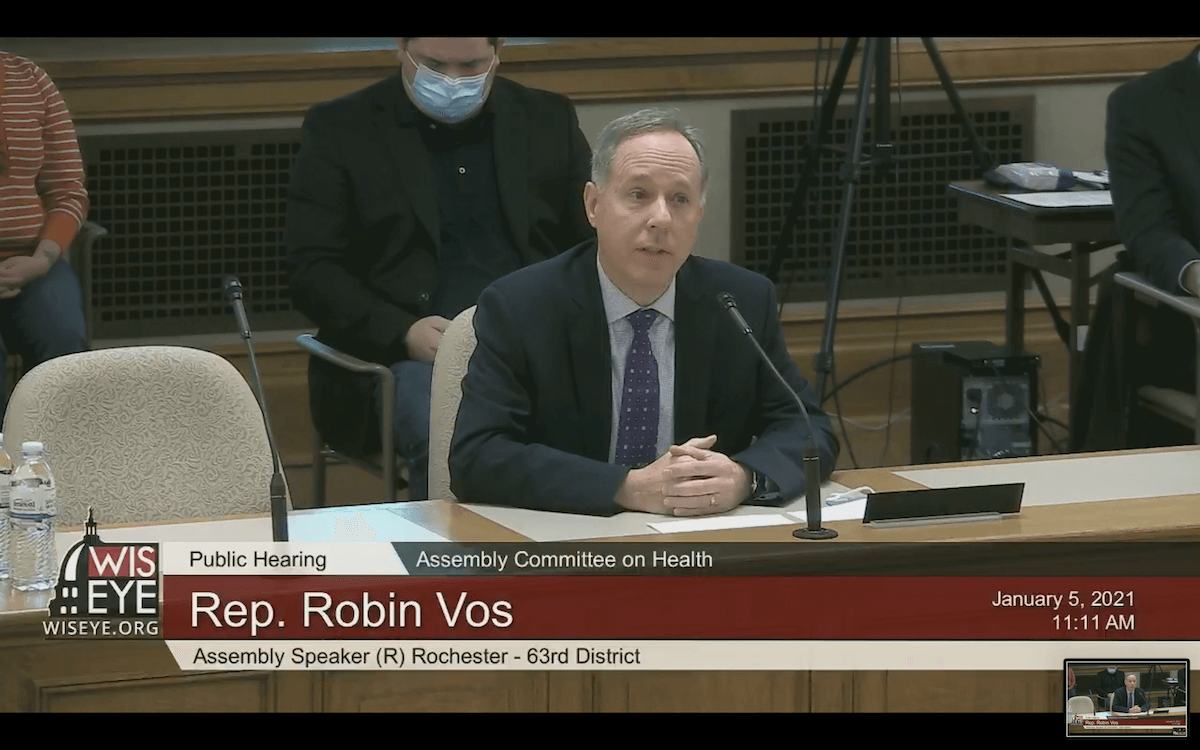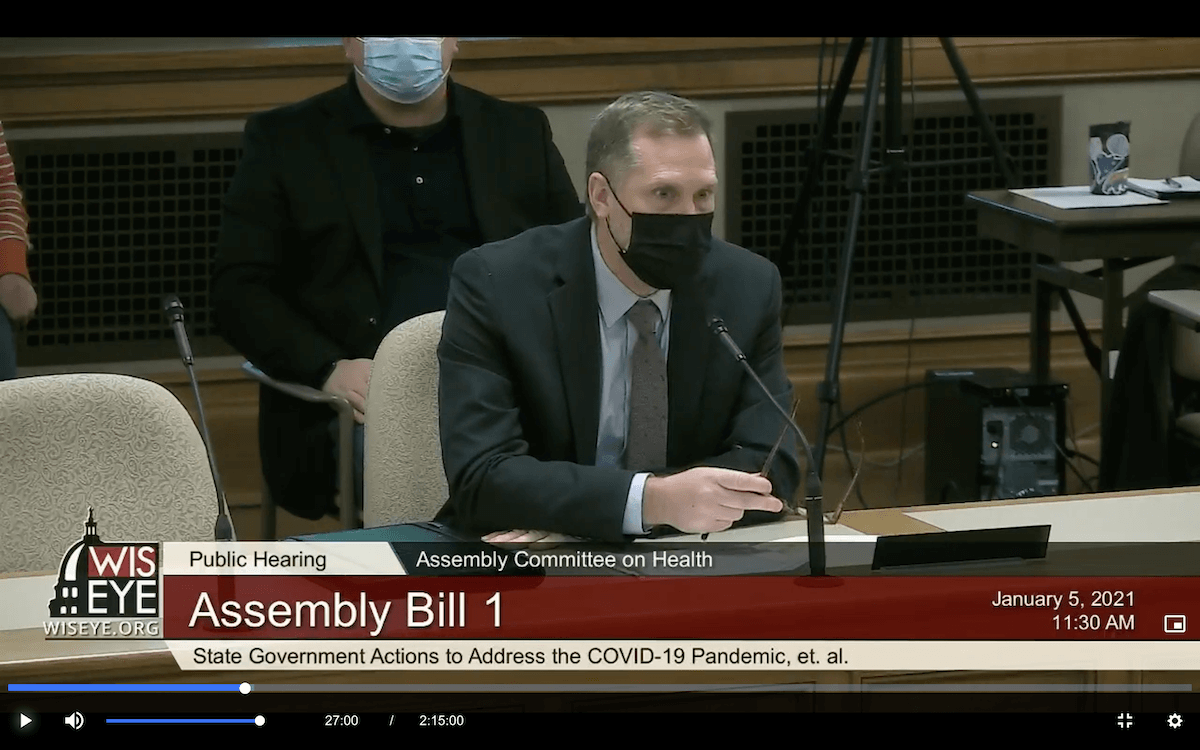
#image_title
Legal organization said GOP bill giving businesses immunity from COVID-19 lawsuits would, “pick winners and losers.”
Despite Gov. Tony Evers indicating a veto is likely, Assembly Republicans continue to fast-track the first bill of the 2021-22 legislative session, a measure that includes some coronavirus aid but is primarily a vehicle to restrict local safeguards and give businesses legal immunity in case their conduct leads to infected workers or customers.
The Assembly’s Committee on Health held a hearing Tuesday morning for their COVID-19 package, less than 24 hours after it was introduced, and sidelining packages put forward by Gov. Tony Evers and Wisconsin Democrats.
In a news conference with reporters Tuesday, Evers said the chances he will veto the Republican bill are “very strong.” Evers said the COVID-19 compromise bill that he and Republican leaders worked on had 20-25 major points Republican leadership had agreed to.
“So, why not get something done?” Evers asked. “Instead, they have decided that bipartisan effort was not to their liking, which is an odd position to take.”
Evers told reporters he had yet to read the Republican bill, Assembly Bill 1 (AB1), which was introduced Monday.
“If it includes some of the ones I could absolutely not agree to, then the likelihood of a veto is probably very strong,” Evers said.
Protecting bad actors
The Assembly Health Committee, which is chaired by a Republican, did not allow members to participate virtually. Consequently, Democratic members signed in and returned to their offices to watch the proceedings on WisconsinEye. Republican members frequently removed their masks during the proceedings.
A majority of the discussion during the public hearing centered around a provision that would grant immunity to entities–including government agencies, schools, businesses and nonprofits–from claims holding them liable for spreading COVID-19 to employees, contractors, and clients.
Attorney Heath Straka, legislative liaison for the Wisconsin Association for Justice, a trial attorneys association that promotes a fair and equitable justice system, testified that the provision would, “protect those bad actors we keep hearing about.”
“In our mind the question before the legislature is quite simple: should it enact policies that encourage responsible and safe behavior or policies that discourage it?” Straka said. “We believe and I think most people would agree that you can protect businesses while encouraging safety. We do it all the time.”
RELATED: Businesses Recognized in Menomonie and DePere for Prioritizing Safety of Workers and Customers.
Straka said the immunity provision as laid out in the bill would protect irresponsible and negligent businesses while denying employees and clients the right to trial.
“Our association was founded on the right to a trial by jury for citizens, consumers and businesses in the state of Wisconsin so that we have a fair and impartial justice system,” Straka said. “We believe that big government should not pick winners and losers in legal disputes. That’s what the jury system is for. Picking winners and losers through broad immunity provisions simply does not comport with conservative principles.”

In his testimony before the committee, Assembly Speaker Robin Vos (R-Rochester) said that provision is based on a legislation passed in North Carolina last July. But Wisconsin Association for Justice President Jay Urban told UpNorth News, the bills that have passed in other states look nothing like what’s being proposed for Wisconsin.
“This is a wrongdoer defense bill. It says that you cannot be sued for COVID no matter what you do,” Urban said. “You can own a bar, you can pack as many people as you want, you can have an employee who you know is positive for COVID and have them work. You could spit on somebody with COVID and have no lawsuit.”
The North Carolina law requires entities to provide anyone on the premises with a COVID-19 mitigation plan laying out the rules on the premises, such as masking and social distancing. If someone on the premises doesn’t comply with those rules, the business is immune from any liability if they contract COVID-19. A law passed in Michigan similarly protects businesses if they comply with public health restrictions.
The Wisconsin bill says they can be held accountable if it can be proven the entity exhibited “reckless or wanton conduct or intentional misconduct,” but it also says that ignoring public health orders, such as masking or capacity restrictions, does not count as reckless or wanton conduct or intentional misconduct.
Dana Wachs, an Eau Claire attorney and a Democrat who represented the 91st Assembly District from 2010-18, said existing case law in Wisconsin regarding workplace protections already makes proving such claims extremely difficult.
“Basically the way this is written, it makes it almost impossible for someone to prove that their employer is responsible,” he told UpNorthNews.
Urban said his organization has been reaching out to business organizations to ask if any lawsuits have come forward in Wisconsin. So far, they have seen no evidence that a civil case over COVID-19 exposure has been filed, in part because it is so difficult to prove liability already.
“Like a nursing home that knows one of its nurses has COVID and instead taking him or her off the floor puts them in direct contact with patients and one of the patients dies. That would be a case that should be brought in our opinion,” Urban said. “This provision would protect that nursing home.”
Wachs also questioned the constitutionality of back-dating to last March the language in the bill that shields employers from legal liability related to any possible actions exposing workers to the virus. He added the employer immunity part of this bill appears to be intended to provide against any related federal COVID-19 legislation mandating protections and that it “most certainly” will be challenged in court.
The Assembly is scheduled to vote Thursday on the package and send it to the Senate.
Julian Emerson and Jessica VanEgeren contributed to this report.

New Biden rules deliver automatic cash refunds for canceled flights, ban surprise fees
In the aftermath of a canceled or delayed flight, there’s nothing less appealing than spending hours on the phone waiting to speak with an airline...

One year on the Wienermobile: The life of a Wisconsin hotdogger
20,000+ miles. 16 states. 40+ cities. 12 months. Hotdogger Samantha Benish has been hard at work since graduating from the University of...

Biden makes 4 million more workers eligible for overtime pay
The Biden administration announced a new rule Tuesday to expand overtime pay for around 4 million lower-paid salaried employees nationwide. The...

‘Radical’ Republican proposals threaten bipartisan farm bill, USDA Secretary says
In an appearance before the North American Agricultural Journalists last week, United States Department of Agriculture (USDA) Secretary Tom Vilsack...




